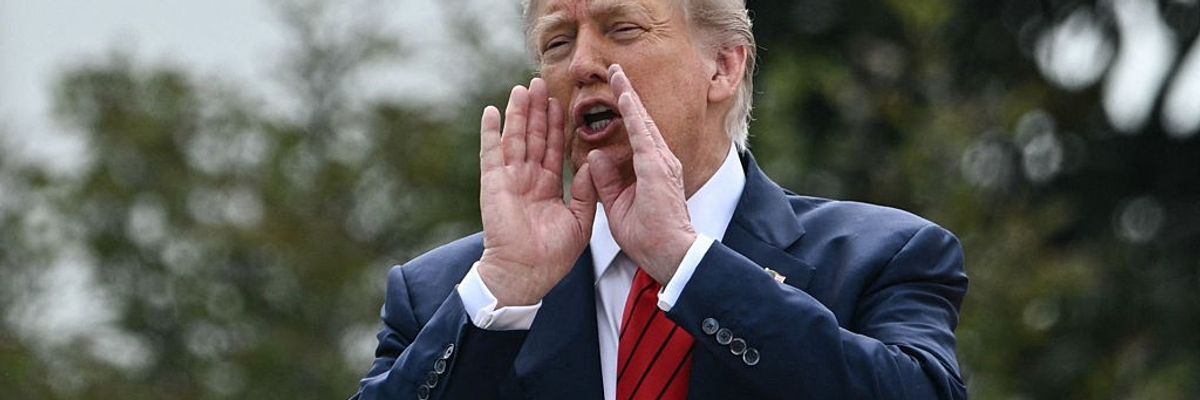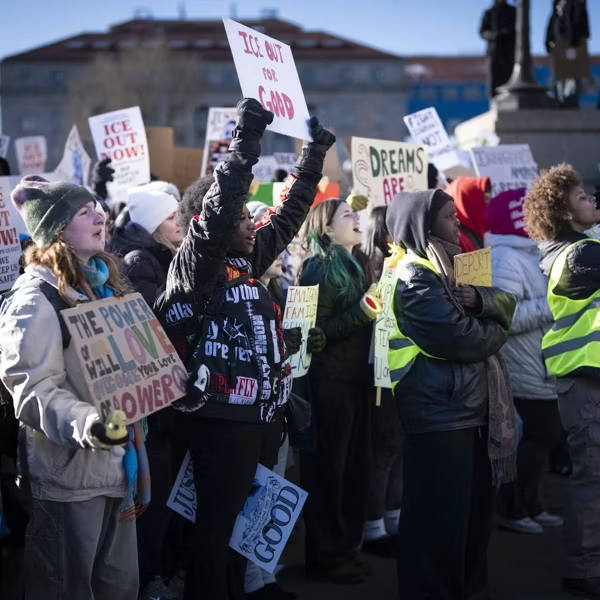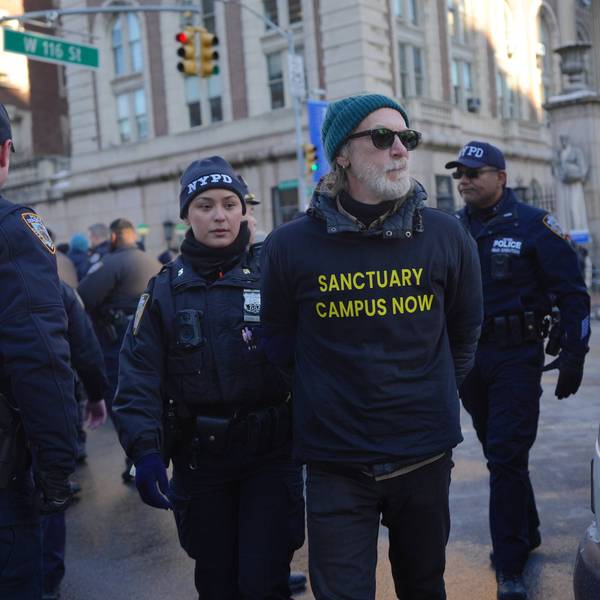
U.S. President Donald Trump speaks to the press from a rooftop as he surveys the grounds of the White House in Washington, D.C., on August 5, 2025.
US Colleges Could Lose Up to 150K International Students This Year Amid Trump Crackdown
"The immediate economic losses projected here are just the tip of the iceberg," explained the CEO of the NAFSA: Association of International Educators.
The number of international students enrolling at U.S. colleges looks set to plummet this fall, according scenario modeling by an organization that advocates on behalf of academic exchange worldwide.
Insider Higher Ed reported on Tuesday that new data from the group, NAFSA: Association of International Educators, has found that American colleges could lose up to 150,000 international students in the coming academic year, which would represent a decline of up to 40% in foreign enrollment. In fact, the projected drop in international students is so large that it could lead to a drop in overall enrollment of 15%.
NAFSA cited multiple factors leading to the projected decline in international students: a three-week period between late May and the middle of June where student visa interviews were suspended all together; limited appointments available for students in countries such as India, China, Nigeria, and Japan; and new visa restrictions on 19 different countries stemming from an executive order U.S. President Donald Trump signed in early June.
NAFSA projected that the consequences of losing 150,000 international students this fall would be grim not just for universities but also the American economy as a whole. In all, the association found that a drop in students of that magnitude "would deprive local economies of $7 billion in spending and more than 60,000 jobs."
Fanta Aw, the executive director of NAFSA, emphasized that the United States would suffer even greater long-term damage from its policies discouraging the enrollment of international students.
"The immediate economic losses projected here are just the tip of the iceberg," Aw explained. "International students drive innovation, advance America's global competitiveness, and create research and academic opportunities in our local colleges that will benefit our country for generations. For the United States to succeed in the global economy, we must keep our doors open to students from around the world."
Trump and his administration have been going to war with the American higher education system by withholding federal research funding from universities unless they agree to a list of demands such as eliminating diversity, equity, and inclusion programs, and reviewing their policies for accepting international students.
The administration has also cracked down on international students who are already in the U.S. and has detained them and threatened them with deportation for a wide range of purported offenses such as writing student newspaper editorials critical of the Israeli government, entering the country with undeclared frog embryos, and having a single decade-old marijuana possession charge.
An Urgent Message From Our Co-Founder
Dear Common Dreams reader, The U.S. is on a fast track to authoritarianism like nothing I've ever seen. Meanwhile, corporate news outlets are utterly capitulating to Trump, twisting their coverage to avoid drawing his ire while lining up to stuff cash in his pockets. That's why I believe that Common Dreams is doing the best and most consequential reporting that we've ever done. Our small but mighty team is a progressive reporting powerhouse, covering the news every day that the corporate media never will. Our mission has always been simple: To inform. To inspire. And to ignite change for the common good. Now here's the key piece that I want all our readers to understand: None of this would be possible without your financial support. That's not just some fundraising cliche. It's the absolute and literal truth. We don't accept corporate advertising and never will. We don't have a paywall because we don't think people should be blocked from critical news based on their ability to pay. Everything we do is funded by the donations of readers like you. Will you donate now to help power the nonprofit, independent reporting of Common Dreams? Thank you for being a vital member of our community. Together, we can keep independent journalism alive when it’s needed most. - Craig Brown, Co-founder |
The number of international students enrolling at U.S. colleges looks set to plummet this fall, according scenario modeling by an organization that advocates on behalf of academic exchange worldwide.
Insider Higher Ed reported on Tuesday that new data from the group, NAFSA: Association of International Educators, has found that American colleges could lose up to 150,000 international students in the coming academic year, which would represent a decline of up to 40% in foreign enrollment. In fact, the projected drop in international students is so large that it could lead to a drop in overall enrollment of 15%.
NAFSA cited multiple factors leading to the projected decline in international students: a three-week period between late May and the middle of June where student visa interviews were suspended all together; limited appointments available for students in countries such as India, China, Nigeria, and Japan; and new visa restrictions on 19 different countries stemming from an executive order U.S. President Donald Trump signed in early June.
NAFSA projected that the consequences of losing 150,000 international students this fall would be grim not just for universities but also the American economy as a whole. In all, the association found that a drop in students of that magnitude "would deprive local economies of $7 billion in spending and more than 60,000 jobs."
Fanta Aw, the executive director of NAFSA, emphasized that the United States would suffer even greater long-term damage from its policies discouraging the enrollment of international students.
"The immediate economic losses projected here are just the tip of the iceberg," Aw explained. "International students drive innovation, advance America's global competitiveness, and create research and academic opportunities in our local colleges that will benefit our country for generations. For the United States to succeed in the global economy, we must keep our doors open to students from around the world."
Trump and his administration have been going to war with the American higher education system by withholding federal research funding from universities unless they agree to a list of demands such as eliminating diversity, equity, and inclusion programs, and reviewing their policies for accepting international students.
The administration has also cracked down on international students who are already in the U.S. and has detained them and threatened them with deportation for a wide range of purported offenses such as writing student newspaper editorials critical of the Israeli government, entering the country with undeclared frog embryos, and having a single decade-old marijuana possession charge.
- Cornell Under Fire as Suspended Pro-Palestinian Student at Risk of Deportation ›
- In 'Intolerable Attack,' Trump DHS Blocks Harvard From Enrolling International Students ›
- Judge Extends Block on Trump DHS Effort to Prevent Harvard Enrollment of Foreign Students ›
- Opinion | Expelling Brilliance: Trump’s Assault on International Students Imperils America | Common Dreams ›
- 'A Travesty': Trump Suspends Processing of Immigrant Visas From 75 Nations | Common Dreams ›
The number of international students enrolling at U.S. colleges looks set to plummet this fall, according scenario modeling by an organization that advocates on behalf of academic exchange worldwide.
Insider Higher Ed reported on Tuesday that new data from the group, NAFSA: Association of International Educators, has found that American colleges could lose up to 150,000 international students in the coming academic year, which would represent a decline of up to 40% in foreign enrollment. In fact, the projected drop in international students is so large that it could lead to a drop in overall enrollment of 15%.
NAFSA cited multiple factors leading to the projected decline in international students: a three-week period between late May and the middle of June where student visa interviews were suspended all together; limited appointments available for students in countries such as India, China, Nigeria, and Japan; and new visa restrictions on 19 different countries stemming from an executive order U.S. President Donald Trump signed in early June.
NAFSA projected that the consequences of losing 150,000 international students this fall would be grim not just for universities but also the American economy as a whole. In all, the association found that a drop in students of that magnitude "would deprive local economies of $7 billion in spending and more than 60,000 jobs."
Fanta Aw, the executive director of NAFSA, emphasized that the United States would suffer even greater long-term damage from its policies discouraging the enrollment of international students.
"The immediate economic losses projected here are just the tip of the iceberg," Aw explained. "International students drive innovation, advance America's global competitiveness, and create research and academic opportunities in our local colleges that will benefit our country for generations. For the United States to succeed in the global economy, we must keep our doors open to students from around the world."
Trump and his administration have been going to war with the American higher education system by withholding federal research funding from universities unless they agree to a list of demands such as eliminating diversity, equity, and inclusion programs, and reviewing their policies for accepting international students.
The administration has also cracked down on international students who are already in the U.S. and has detained them and threatened them with deportation for a wide range of purported offenses such as writing student newspaper editorials critical of the Israeli government, entering the country with undeclared frog embryos, and having a single decade-old marijuana possession charge.
- Cornell Under Fire as Suspended Pro-Palestinian Student at Risk of Deportation ›
- In 'Intolerable Attack,' Trump DHS Blocks Harvard From Enrolling International Students ›
- Judge Extends Block on Trump DHS Effort to Prevent Harvard Enrollment of Foreign Students ›
- Opinion | Expelling Brilliance: Trump’s Assault on International Students Imperils America | Common Dreams ›
- 'A Travesty': Trump Suspends Processing of Immigrant Visas From 75 Nations | Common Dreams ›

